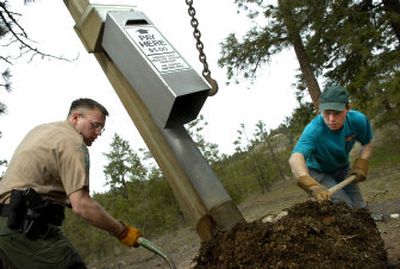A farewell to fees

Spokane Valley residents Adrian Brophy and his wife, Sherry, stopped by Riverside State Park last year to take in the view at the Bowl and Pitcher. Then they saw a notice about the $5 day-use fee.
“We came down here and saw the $5 fee and left. We don’t want to pay $5 just to walk around,” Brophy said Sunday, as he led his 6-year-old daughter, Logan, down for her first look at the rock formation rising from the Spokane River. “I can see paying the money to come down and camp.”
So what changed in a year? The state Legislature eliminated the $5 day-use fee at the state’s 120 parks. That includes two of the largest – Mount Spokane and Riverside. Though the fee raised $3.4 million annually for much-needed maintenance, it also contributed to 8 million fewer people visiting each year, a 16 percent decline, said Virginia Painter, a spokeswoman for the state Parks and Recreation Commission.
Even though the law eliminating the fee doesn’t take effect until April 9, state parks officials decided to stop collecting the money. Last week, Riverside State Parks officials pulled out the “iron ranger” pay stands where visitors had inserted money.
“That’s one reason we’re here,” said Leslie Getchell, who was returning from a three-hour hike with her husband, Roger, on Sunday afternoon. The South Hill residents are avid hikers who said they chose other places to hike after Riverside started charging in 2003. They returned Sunday after seeing news reports that the fee had been eliminated.
Leslie Getchell said, however, that she was glad to see the Legislature had replaced most of the money lost when the fee was eliminated. The Legislature issued a one-time allocation of $3.1 million to make up most of that revenue.
In addition, Painter said, the Legislature has promised to look for permanent funding in its next session. Legislators said in news reports that eliminating the fee was one of the most popular proposals this session among their constituents, who felt they already paid for parks through taxes.
That rang true for Olga Cook, of Medical Lake, who arrived just before 5 p.m. Sunday to barbecue steaks for dinner with her family. She was looking for the pay stand when she was told the fee had been eliminated. She and her husband, Ronald, and their young daughter, Nicole, visit the park several times per year.
“We can afford to pay, but it just doesn’t feel like you (should) have to pay to go into a park,” said Cook, who moved here from Russia three years ago. She said parks are free there. “Everything is open to the public.”
Like other visitors, the Cooks said the fee hasn’t kept them from attending Riverside State Park, but it has kept them from attending as frequently. They sometimes went to Riverfront or Manito parks instead to avoid the $5 hit.
This is my favorite park,” she said of Riverside. “It’s more untouched, more like a forest.”
That wild quality of some parks could give way to more modern trappings in the future as the parks commission works to raise more money through installation of cabins, yurts or additional recreational vehicle sites.
The parks commission also earns money by renting out campsites and group shelters and by charging for watercraft launches and waste dumping from RVs.
The Legislature also gave state parks the option of tracking expenditures and requesting supplemental funding next session, Painter said.
“The pressure is still on us to raise our own revenue,” she said.
In fact, cabins or yurts could be installed in the future at Bald Nob campground in Mount Spokane State Park, said Clyde Anderson, the only Spokane member of the state parks commission. He said demand is growing for recreational vehicle sites and for more modern conveniences in the parks.
“So many people have motor homes and trailers, and that’s what they want, with the creature comforts of water, electricity and sewer,” Anderson said.